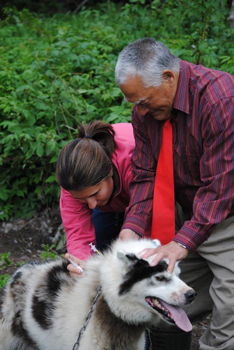From the Editor: A Great Man Has Passed
Passage
Baker Lake MLA Speaks Out in Support of Nunavut's Inuit Dogs
Proposed New Dog By-law, a Threat to Iqaluit Dog Team Owners?
Published Research Has Implications for the Aboriginal Inuit Sled Dog!
Fan Mail
The Chinook Project’s July 2013 Visit to Labrador
NFB Increases Internet Accessibility to its Film Library
Movie Review: Vanishing Point
Problems Accessing/Viewing Pages
IMHO: The Back Story of the Thank You DVD
Index: Volume 15, The Fan Hitch
Navigating This Site
Index of articles by subject
Index of back issues by volume number
Search The Fan Hitch
Articles to download and print
Ordering Ken MacRury's Thesis
Our comprehensive list of resources
Defining the Inuit Dog
Talk to The Fan Hitch
The Fan Hitch home page
Editor: Sue Hamilton
Webmaster: Mark Hamilton
The Fan Hitch, Journal
of the Inuit Sled Dog, is published four
times a year. It is available at no cost
online at: https://thefanhitch.org.
The Fan Hitch welcomes your letters, stories, comments and suggestions. The editorial staff reserves the right to edit submissions used for publication.
Contents of The Fan Hitch are protected by international copyright laws. No photo, drawing or text may be reproduced in any form without written consent. Webmasters please note: written consent is necessary before linking this site to yours! Please forward requests to Sue Hamilton, 55 Town Line Rd., Harwinton, Connecticut 06791, USA or mail@thefanhitch.org.
This site is dedicated to the Inuit Dog as well as related Inuit culture and traditions. It is also home to The Fan Hitch, Journal of the Inuit Sled Dog.
The Fan Hitch welcomes your letters, stories, comments and suggestions. The editorial staff reserves the right to edit submissions used for publication.
Contents of The Fan Hitch are protected by international copyright laws. No photo, drawing or text may be reproduced in any form without written consent. Webmasters please note: written consent is necessary before linking this site to yours! Please forward requests to Sue Hamilton, 55 Town Line Rd., Harwinton, Connecticut 06791, USA or mail@thefanhitch.org.
This site is dedicated to the Inuit Dog as well as related Inuit culture and traditions. It is also home to The Fan Hitch, Journal of the Inuit Sled Dog.

Doug Jacque and Dr. Nicole Breda vaccinating
one of his sled dogs Photo: Andrea Jack
The Chinook Project’s July 2013 Visit to Northern Labrador, Canada
Marti Hopson, DVM, Veterinary Coordinator, Chinook Project
with contribution by Andrea Jack, RVT
The Chinook Project continues to travel annually to remote communities in Canada’s North to provide free veterinary services. This year the team travelled to Makkovik and Postville, two coastal villages in Northern Labrador. As well as seeing approximately 100 animals for vaccines, deworming and spay/neuter surgeries, they also collected (with permission) swabbed samples of the skin surface of the dogs attending the clinic. These samples were tested for MRSA (methicillin-resistant Staph aureus, which is very difficult to treat) to help determine if the canine population is a significant reservoir of this bacteria. We hope to be able to continue to help gather data for a research project that could help both the animal and human populations of these communities.
Andrea Jack, a registered veterinary technician from the Atlantic Veterinary College who helped organize and run the trip this year reflected,
“After returning from an amazing trip to Northern Labrador, I am so grateful for having had this opportunity. We left as nine individuals – some acquaintances, some complete strangers. We returned as a team of nine who made a difference in lives of people and animals in two Northern communities in Labrador.We look forward to planning next year’s trip. One piece of exciting news is that we have secured ongoing financial support from the government of Newfoundland and Labrador who will fund a portion of the Project – therefore we hope to be able to continue on for many years to come.
Our first stop was in Makkovik, a beautiful coastal community with a population of just over 350 people. The project had visited this community before and we were greeted with open arms by some of the most helpful people you could imagine. Although our stop here was brief (just 2½ clinic days) we saw a number medical cases and preformed 15 surgeries.
We left Makkovik by fishing boat and were treated to some amazing up close views of icebergs and the beautiful Labrador coastline. Postville was our second stop, a remote, beautiful coastal community located across the bay from spectacular Post Hill (which is a truly breathtaking mountain). Postville is a tiny community of just over 250 people. Again, the people were helpful and in our four clinic days we performed 25 surgeries and saw 39 medical cases. One of our most interesting medical cases was a house call for a team of sled dogs owned by a delightful 82 year-old man who still races his team.
It was an amazing experience and I am so grateful for having this opportunity. Not only do I feel, by giving back to communities that lack regular access to veterinary services, that I've done something good for them, but it also changes me and makes me a little more grateful for everything I have.”